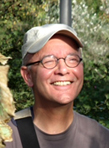Shake v/d week is Ghoonghat Ohle Na Luk Sajna, gezongen door Abida Parveen, ‘Queen of Sufi music’.
Ik sla Wikipedia er maar op na:
Abida Parveen is referred as one of the world’s greatest mystic singers. She is reportedly among the highest paid singers in Pakistan. She sings mainly (!) Ghazals, Thumri, Khyal, Qawwali, Raga, Sufi rock, Classical, Semi-classical music, and her forte, Kafis, a solo genre accompanied by percussion and harmonium, using a repertoire of songs by Sufi poets. Parveen sings in Urdu, Sindhi, Saraiki, Punjabi, Arabic and Persian.
Main mushtaq dedar de haan
Hide not behind the veil, my love,
I long to have a glimpse of you.
Tokaan kardey luk sbhoi
Jeker yaar karey diljoi
Taan faryaad pukaar de haan
People around me laugh at me.
He should come and cheer me up,
This alone remains my plea,
Main mushtaq dedar de haan
Hide not behind the veil, my love,
I long to have a glimpse of you.
Mil mahi jind aweien jand
Eik dam hijr nahi main sahndi
Bulbul main gulzar de haan
Come my love and rescue me
No longer can I perch elsewhere
I am the Bulbul of your tree
Main mushtaq dedar de haan
Hide not behind the veil, my love,
I long to have a glimpse of you.
Ows dey hath Quraan hey owsey gul zanaar
A queer type friend!
He has the Quran in His hand and
And in the same the holy thread
Baba Bulleh Shah
 |
| Tombe van Hazrat Baba Bulleh Shah, Qasur, Punjab, Pakistan |
Van de Soefi dichter Hazrat Baba Bulleh Shah (1680-1757) wordt gezegd dat hij ‘een baken van vrede’ was. Toch werden zijn bemoeienissen met de, veelal religieuze, conflicten van zijn tijd (met name die tussen Moslims en Sikhs) hem niet in dank afgenomen…
Maar – zoals mijn bron zegt – ‘mysterious is the turn of time’:
“The man who had been refused by the mullahs to be buried after his death in the community graveyard because of his unorthodox views, today enjoys worldwide reverence and recognition. The tomb of Bulleh Shah in Qasur and the area around it is today the only place free of collective refuse, and the privileged of the city pay handsomely to be buried in the proximity of the man they had once rejected.”
